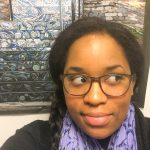

By: Gail Obenreder
Gemelle John quips that she’s “slowly moving down the East Coast.” The Wilmington resident was born in Brooklyn, grew up in Queens and then lived her teen years in New Jersey. A University of Delaware graduate, the young poet came here for college. Her first post-graduate job was teaching middle school here in the state, and here she’s stayed.
That teaching job, and working with those students, led her to a belief in the power of writing, especially poetry, to change lives. Being a teacher and finding the time to write is a healthy challenge for her. But John considers education as a vocation. “As an educator, besides passing along my non-poetry content, my teaching and writing inspiration comes from reflecting on this quandary: Where are we going?”
John seeks an answer to this metaphysical question for herself as well as for her students, and she does so through writing. She grapples with and explores the ways in which poetry can enhance interpersonal communication and civility. And one of her solutions is her strong and evolving commitment to social justice groups and causes, both here in Delaware and with the Sanctuary Poets of Philadelphia.
“Love but a dry space” (2017)
Skin fragments the hour or maybe the puzzle is this time, angry and coin shaped, a value and a
noise. They drip into craters transparent and thick their necks becoming longer and longer until it
isn’t dancing. In the softer pauses they think about the ways the trees bleed dust, grieve
Another way John can effect the social change she seeks has come through the power and directness of spoken-word poetry, “making a verbal space people might have only felt” that moves them “emotionally and to action.” Working with UD poet and professor Devon Miller Duggan changed the trajectory of her writing, and in addition to contemporary poets, John is inspired by the work of theatre artist Lin-Manuel Miranda, citing his “mastery of multimedia invested in diversity.”
A lover of the arts overall – dance, craft, theatre – John was totally surprised to receive the Division’s Artist Fellowship. She plans to “hit the ground running,” using the award to attend writing workshops and retreats. She wants to publish more, making her work accessible and available to a wider audience. She’s not sure where she – and her work – will end up, but “poetry will be there along the way.”
Masters
Established
Emerging